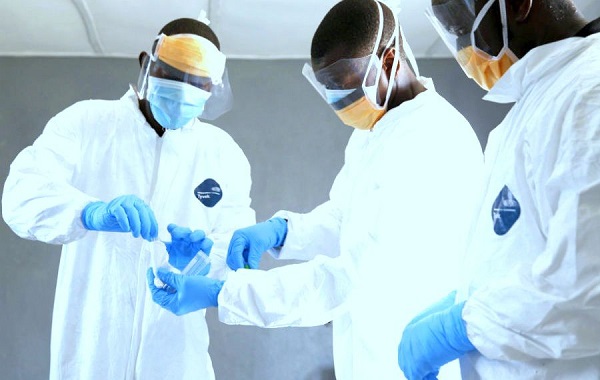The Nigerian government has appealed to the striking resident doctors to return to work while talks continue on the areas of disagreement.
The health minister, Osagie Ehanire, made the appeal during the 18th ministerial briefing, which was held at the Presidential Villa in Abuja, on Thursday.
The minister, who said Nigeria could be the only country in the world where doctors are on strike amidst the global pandemic, said the ‘No Work, No Pay’ rule isn’t a punitive measure against the striking doctors but an implementation of the provisions of law.
He said embarking on industrial action in the middle of an outbreak is “unconscionable.”
“We have said openly that this is not a good time for doctors to go on strike. We are having a strike for the third time this year; that is not good.
“Every country who has a difficult situation at this time should understand that responsibility is on all of us. If you have any problem, any grudges, let’s talk about it.
“I think Nigeria is probably the only country in the world today where doctors are dropping work in the middle of a threat to the whole country,” he said.
‘No Work, No Pay'
Speaking on the ‘No Work, No Pay’ policy of the government, the minister said; “Yes, but that’s the standard thing. ILO recommends that if you didn’t work, then why will you take your salary that comes from taxpayers’ money.
“Because if that is so, you can’t be encouraged to stay home for six months and your salary is running from public funds, from taxpayers’ money, or you have not given the community any service.”
Mr Ehanire also noted that the government has not threatened the doctors but “you do not put people’s lives at risk. That is what the minister of labour is saying. Nobody has threatened anybody with anything.”
Earlier, while appearing on a Channels Television’s programme – Politics Today – last Friday, the minister of labour and employment, Chris Ngige, said the doctors were taking the country for a ride.
He also threatened that the doctors would be sacked by their various employers if the seven-day ultimatum he issued them expires.
The ultimatum, according to the minister expired on Monday.
However, in spite of the threat, the doctors said the strike would continue until their demands are met.
The strike entered its 12th day on Friday.
Blame the states too
Mr Ehanire said the federal government is not entirely responsible for meeting all the demands tabled by the striking doctors.
He said seven of the 12 demands listed are issues between the doctors and governments of some states.
“Part of the problem we have is that some of the demands are with state governments, not the federal government. So if the state government has not paid some people a salary why go on a nationwide strike?
“Among the 12 original demands that they made, seven were state-related and the federal government cannot compel a state to pay you a certain salary that you want,” he said.
The National Association of Resident Doctors (NARD) on Monday, August 2, resumed indefinitely the strike it had suspended earlier in April, saying having observed things for more than 100 days, the union realised that the government was taking its members for granted.
The doctors’ grievances are contained in a Memorandum of Action (MOA), endorsed in April by both the striking doctors and the government representatives, including Mr Ngige.
They had demanded, amongst other things, the immediate payment of COVID-19 inducement allowance to some of its members in federal and state tertiary institutions.
They also demanded a review of the hazard allowance for health workers due to the risk associated with their profession.
The association also decried the undue hardship its members on GIFMIS platform are facing due to the delays in payment of their salaries ranging from three to seven months.
On cholera outbreak
On the cholera outbreak in the country, Mr Ehanire said the country will distribute chemicals for treating water to areas of concern.
He said cholera was caused by contaminated water consumed by people.
The minister said, “If you drink raw water from the stream and other raw water (sources, which) is carrying the cholera bacteria because somebody upstream has already defecated in water, downstream, you think you’re getting pure water, you’re not.
“So people go freely and collect water. Now that’s why we advise them that the least they can do is to boil the water that they are going to drink. If you have a chemical to treat it, you can treat it.
“Now we are looking for that chemical treatment to send to areas of concern.”
Meanwhile, as of August 1, 2021, a total of 31,425 suspected cholera cases and 816 deaths have been recorded in 22 states and the FCT since the beginning of the outbreak in January, according to the Nigeria Centre for Disease Control (NCDC).
The affected states are Benue, Delta, Zamfara, Gombe, Bayelsa, Kogi, Sokoto, Bauchi, Kano, Kaduna, Plateau, Kebbi, Cross-River, Niger, Nasarawa, Jigawa, Yobe, Kwara, Enugu, Adamawa, Kastina, Borno and FCT.
By Nike Adebowale,
Premium Times



